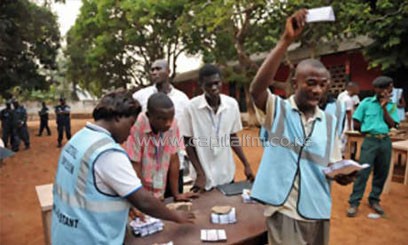
Akufo-Addo is offering parents a deal that seems difficult to refuse: abolishing fees at senior high schools which can amount to several hundred dollars per term and keep education out of reach for many families/FILE
“If I can’t afford it, I’ll send them to the village to farm,” Ampedu said.
Ampedu is the type of voter Ghana’s main opposition presidential candidate, Nana Akufo-Addo of the New Patriotic Party, is counting on in December 7 elections.
Akufo-Addo is offering parents a deal that seems difficult to refuse: abolishing fees at senior high schools which can amount to several hundred dollars per term and keep education out of reach for many families.
The ruling party and incumbent President John Dramani Mahama says the idea is great on paper, but not yet possible as the money shortage could greatly harm education in this nation of 20 million people.
He prefers to concentrate on improving education and eventually working toward the goal of completely free schooling.
The voters will have their say, but the fact that a true policy debate has occurred seems to be another sign of Ghana’s maturing democracy.
The country has already gained a reputation in recent years as a relatively stable democracy in West Africa, where a number of countries continue to struggle with instability.
Its economy is the second largest in the region thanks to exports of gold and cocoa. The government is counting on oil production, which began in 2010, to grow the economy further.
But there is much to be done to improve education, with some teachers in rural areas holding classes under trees and those in cities sometimes badly under-equipped.
Free schooling is a tantalising offer in Ghana, where the World Bank estimates the average Ghanaian makes about $1,400 a year and the government says only about 14 percent of people finish high school.
Ghana’s constitution guarantees free education, but only on paper. In reality, high school students often have to hand over cash for a list of supplies and services, ranging from the library to uniforms.
There is worry that free high school could drain government coffers.
“It is possible that it could be done, but of course that would mean that you would have to forgo other priorities,” said Franklin Cudjoe, founding director of thinktank IMANI Centre for Policy and Education.
“We haven’t heard about what would be cut back.”
In a speech in August, Akufo-Addo estimated that it would cost about $400 million to implement free high school next year, and eventually go up to $768.6 million after three years.
Mahama has rejected that as too expensive. His National Democratic Congress party would rather focus for now on expanding secondary education and building public universities.
Though its education system is better than many of its neighbours, a recent UNESCO report said half of women and a third of men in Ghana who had completed six years of schooling could not read.
The opposition NPP has said it would pay for the expanded education with revenue from Ghana’s oil sector, which currently produces about 86,000 barrels per day but has plans to expand. Cudjoe disputes this.
“I think we have infrastructure problems… It’s better to fix those problems than go into free (senior high school),” Cudjoe said.














































